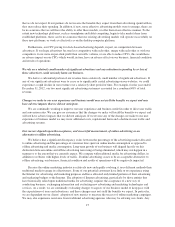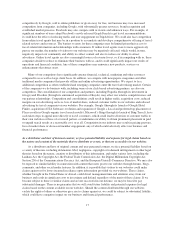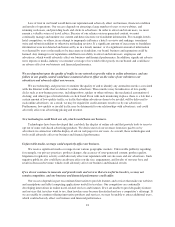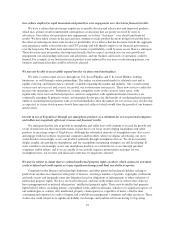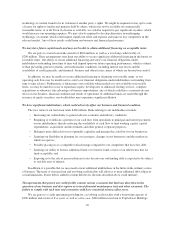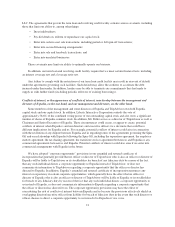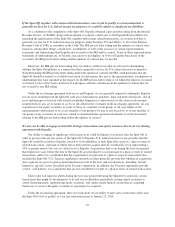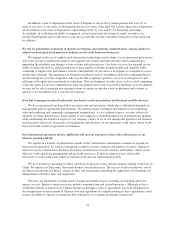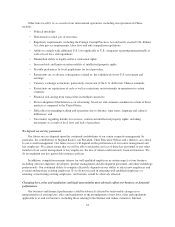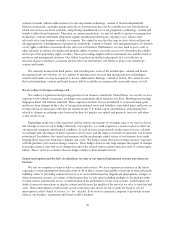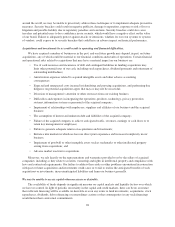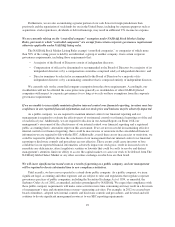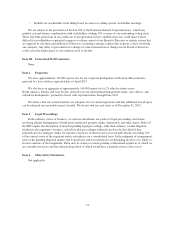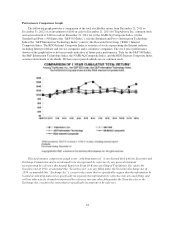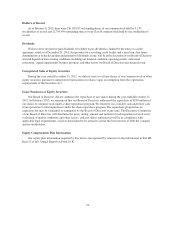TripAdvisor 2012 Annual Report Download - page 35
Download and view the complete annual report
Please find page 35 of the 2012 TripAdvisor annual report below. You can navigate through the pages in the report by either clicking on the pages listed below, or by using the keyword search tool below to find specific information within the annual report.advertising, consumer protection and privacy. Unfavorable changes could decrease demand for products and
services, limit marketing methods and capabilities, increase costs and/or subject us to additional liabilities.
For example, there is, and will likely continue to be, an increasing number of laws and regulations
pertaining to the Internet and online commerce that may relate to liability for information retrieved from or
transmitted over the Internet, online editorial and user-generated content, user privacy, behavioral targeting and
online advertising, taxation, liability for third-party activities and the quality of products and services. Our
current business partner arrangements with third parties, including Facebook, could be negatively impacted to the
extent that more restrictive privacy laws or regulations are enacted, particularly in the United States or European
Union. In addition, enforcement authorities in the United States continue to rely on their authority under existing
consumer protection laws to take action against companies relating to data privacy and security practices. The
growth and development of online commerce may prompt calls for more stringent consumer protection laws and
more aggressive enforcement efforts, which may impose additional burdens on online businesses generally.
Liberty Interactive Corporation currently is a controlling shareholder.
Liberty Interactive Corporation effectively controls the outcome of all matters submitted to a vote or for the
consent of our stockholders (other than with respect to the election by the holders of our common stock of 25%
of the members of our Board of Directors and matters as to which Delaware law requires separate class votes).
Liberty’s control of us, as well as the existing provisions of our organizational documents and Delaware law,
may discourage or prevent a change of control of us, which may reduce the market price of our common stock.
Our effective tax rate is impacted by a number of factors that could have a material impact on our financial
results and could increase the volatility of those results.
Due to the global nature of our business, we are subject to income taxes in the United States and other
foreign jurisdictions. In the event we incur net income in certain jurisdictions but incur losses in other
jurisdictions, we generally cannot offset the income from one jurisdiction with the loss from another, which
could increase our effective tax rate. Furthermore, significant judgment is required to calculate our worldwide
provision for income taxes. In the ordinary course of our business there are many transactions and calculations
where the ultimate tax determination is uncertain. By virtue of our previously filed separate company and
consolidated income tax returns with Expedia we are routinely under audit by federal, state and foreign taxing
authorities. Although we believe our tax estimates are reasonable, the final determination of audits could be
materially different from our historical income tax provisions and accruals. The results of an audit could have a
material effect on our financial position, results of operations, or cash flows in the period or periods for which
that determination is made.
Additionally, we earn an increasing portion of our income, and accumulate a greater portion of cash flow, in
foreign jurisdictions. Any repatriation of funds currently held in foreign jurisdictions may result in higher
effective tax rates and incremental cash tax payments. In addition, there have been proposals to amend U.S. tax
laws that would significantly impact the manner in which U.S. companies are taxed on foreign earnings.
Although we cannot predict whether or in what form any legislation will pass, if enacted, it could have a material
adverse impact on our U.S. tax expense and cash flows.
We cannot be sure that our intellectual property is protected from copying or use by others, including potential
competitors.
Our websites rely on content, brands and technology, much of which is proprietary. We protect our
proprietary content, brands and technology by relying on a combination of trademarks, copyrights, trade secrets,
patents and confidentiality agreements. In connection with our license agreements with third parties, we seek to
control access to, and the use and distribution of, proprietary technology, content and brands. Even with these
precautions, it may be possible for another party to copy or otherwise obtain and use our proprietary technology,
25


